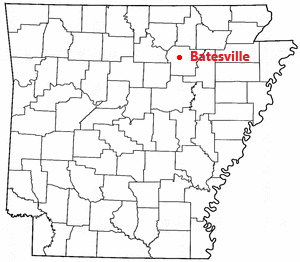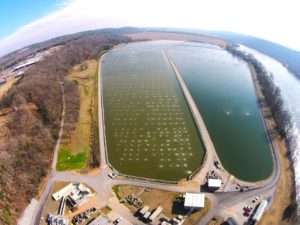Local Government:
City of Batesville, ArkansasProject:
Batesville Floating Solar ProjectCategory:
On-Site SolarProject Purpose
To build a 6 MW floating solar facility to supply about 97% of the City of Batesville’s annual electricity needs for municipal offices and facilities while reducing energy costs.
Project Overview

In August 2021, the Batesville City Council authorized the City of Batesville to enter into an agreement with Entegrity Energy Partners to design, construct, and operate a floating solar array located on a large retention pond at the Batesville Wastewater Treatment Plant. Once operational, in winter 2022, the solar array will be one of the largest floating solar facilities in the United States and is projected to produce more than 12 million kWh of power annually, equivalent to powering 1,100 homes.
This project will enable the City of Batesville to power approximately 97% of its municipal operations with clean energy, including 100% of its wastewater treatment facility. In contrast, the City currently obtains all of its electricity from Entergy Arkansas, which produces 52% of its electricity from fossil fuels (17% from coal and 35% from natural gas). This solar project will significantly mitigate the City’s greenhouse gas emissions by reducing its consumption of fossil fuels. The first year’s generation is estimated to avoid 8,986 metric tons of carbon emissions, the equivalent of removing more than 1,583 vehicles from the roads for one year.
The project will also reduce the City’s energy costs. The floating solar array is expected to decrease City energy bills by $100,000 in its first year of operation and to save at least $3.5 million over the next two decades.
Deploying floating solar allows the City to capture other benefits granted by this approach as well. It helps avoid land use conflicts by not siting solar projects on green space and agricultural areas. And floating solar can benefit reservoirs because the panels reduce evaporation rates by decreasing surface area exposure, inhibiting algae blooms, and reducing the need for chemicals to manage a typically chronic and costly challenge.
“The City of Batesville is very pleased to become a renewable energy user. We are excited to lessen the impact on the environment, as well as save the tax payers money by the reduction of energy bills on all our city owned projects. We look forward, as a city, to discovering more ways to become eco-efficient.”
City of batesville mayor rick elmbaugh
How was the deal structured?

Batesville has adopted a third-party ownership model to avoid high upfront costs. Entegrity, an Arkansas-based solar development company, will be responsible for designing, building, operating, and maintaining the floating solar array. Instead of owning the project, the City will pay Entegrity for the solar electricity produced by the array over its lifetime. Under this model, municipal governments, like Batesville, can secure a fixed electricity rate that hedges against future electricity market fluctuation.
What were Batesville’s biggest challenges in setting up this project?
Location siting. When the City determined the desired size of this project, it began looking for acceptable sites for a traditional ground-mounted solar project. Due to local topography and a lack of affordable land availability, Entegrity proposed the City consider floating solar. After learning more about this option and considering siting of the solar array on existing large sewer lagoons at Batesville’s wastewater treatment facility, the City concluded it was an effective alternative.
Navigating requirements around possible system operational issues. When a DER project exceeds 5 MW, the Arkansas Public Service Commission requires that the proposed facility undergo both a feasibility study and a system impact study to identify and mitigate potential risks posed to the grid. These requirements added time and effort to the process.
“Batesville is excited to be among the first in Arkansas to install floating solar panels. With a lack of undeveloped land available in our city to place a solar farm, utilizing the existing ponds at our wastewater facility made perfect sense.”
Damon Johnson, Batesville City Engineer
What advice would Batesville give other local governments as they pursue climate action projects?
Anticipate unexpected challenges for ambitious and innovative projects. It can take longer than expected to get approval from regulatory agencies, such as the Arkansas Public Service Commission. Requirements can vary by state or locality. Deploying solar panels on unusual sites like bodies of water can also potentially cause a delay in final decisions due to a lack of familiarity or greater perceived complexity. Engage with stakeholders, including your utility, from the start of project development, and be prepared for additional requirements, such as feasibility and system studies, that may not have been initially expected.
Seek quality and trusted partners. Having a partner who understands the industry and has the capabilities to assist from inception to construction is critical to add capacity and technical knowledge to the city team. Entegrity’s expertise helped the City of Batesville advance the project from concept to creation.
“The Batesville community embraces and promotes innovative change, demonstrating time and again they are leaders not only in Arkansas but nationwide. This project is a continuation of their guiding leadership for other communities, proving that thinking outside of the box can lead to exponential benefits.”
Rick Vance, Regional Director, Entegrity
How does this project fit into Batesville’s broader climate and community goals?
The City of Batesville actively looks for ways to reduce its energy consumption. Such efforts not only benefit the environment but also alleviate the municipal energy burden. This floating solar project will be the City’s second major project to lower energy usage from fossil fuels. In 2012, the City installed a new wastewater treatment system that used about one-third of the energy needed by the former system, saving the City nearly $100,000 every year.
Additional Information and Resources
- City Seeks to Increase Reliance on Renewable Energy (KAIT news story)
- Batesville Enters Agreement with Entegrity Solar (White River Now news article)
- Direct Testimony of Wes Coleman on Behalf of the City of Batesville (Testimony of the project for the Arkansas Public Service Commission)
- Ownership Model Options for On-Site Solar (Renewables Accelerator guidance resource)
- Floating Photovoltaic Systems: Assessing the Technical Potential of Photovoltaic Systems on Man-Made Water Bodies in the Continental United States (National Renewable Energy Lab study)
- Batesville Wastewater Treatment System (Project description of wastewater treatment system upgrade in 2012)
This project was included on the Renewables Accelerator’s list: 10 of the Most Noteworthy Local Government Renewables Deals of 2021.
